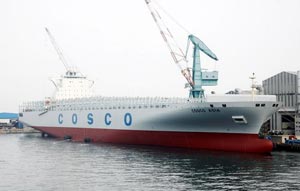

Apart from industrial overcapacity, local governments' excessive involvement in the economy has also led to a fragmented market and regional protectionism.
An official who asked not to be named said that some coal-rich provinces tried to prevent their coal from being sold elsewhere during a period of power shortage in 2011, and later ordered companies in their provinces to purchase locally-produced coal this year, which has seen coal oversupply nationwide.
Without an overall development view, these provinces have encountered overlapping development with huge costs and resource waste.
Li Yizhong, chairman of the China Federation of Industrial Economics, said primary energy consumption last year totaled 3.62 billion tons of standard coal, accounting for 21.6 percent of the world's total. Per capita GDP energy consumption was twice the world's average level, and four times the average levels of developed countries.
This kind of development has caused a deteriorating environment, which will hamper the economic development and social stability of the country, Chi said.
"The unprecedented heavy smog in east and central China this year has sounded the alarm," he said.
Air pollution has been visible in many regions of China. In an extreme case, dense smog shrouded major cities in northeast China last month, closing schools, highways and airports, with visibility of less than 10 meters in certain areas.
Reforms in progress
Prompted by the various problems occurring in the market, reforms have steadily been put forward.
Over the past two consecutive years, the Chinese government lowered its GDP growth target to 7.5 percent, shifting its focus from fast development to economic restructuring.
 Models at Spyder pavilion at SEMA Show
Models at Spyder pavilion at SEMA Show
 Models at Anso pavalion at SEMA Show
Models at Anso pavalion at SEMA Show
 Modified Ford Fiesta by 3D Carbon at SEMA Show
Modified Ford Fiesta by 3D Carbon at SEMA Show
 Modified Ford Fiesta ST by MRT at SEMA Show
Modified Ford Fiesta ST by MRT at SEMA Show
 Modified Ford Fiesta ST by COBB at SEMA Show
Modified Ford Fiesta ST by COBB at SEMA Show
 Hong Kong Optical Fair Kicks off
Hong Kong Optical Fair Kicks off
 The predicted christmas best gifts for children
The predicted christmas best gifts for children
 Voyage to a sustainable future
Voyage to a sustainable future